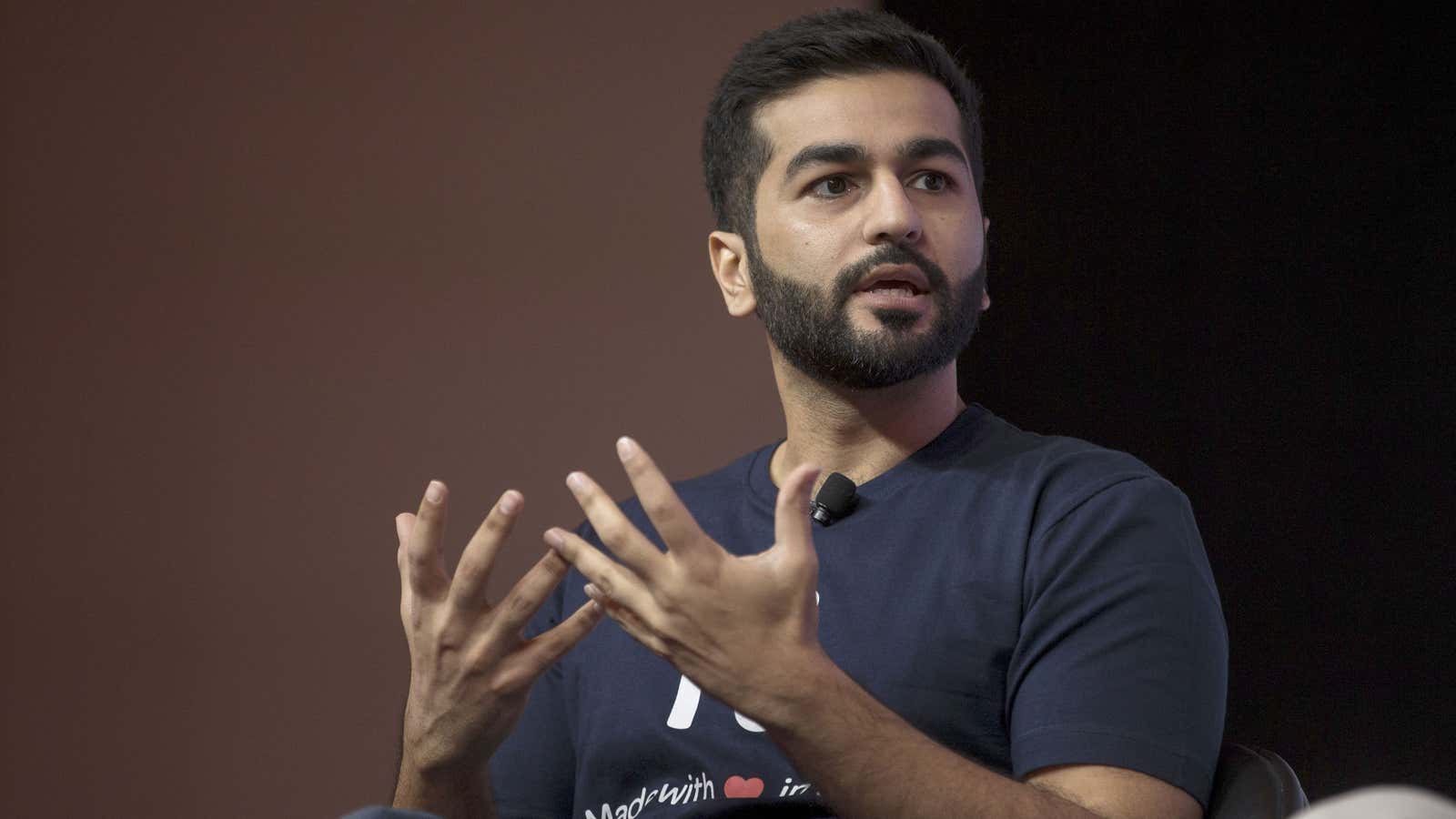On Jan. 6, Kavin Bharti Mittal, the founder of the eight-year-old Indian instant messenger Hike, tweeted that the app was starting the new year “with a bang” by bettering its social media platform and adding gaming to the gamut. Buried in that news was the fact that the company was retiring StickerChat, formerly Hike Messenger, which the flagship product of Mittal’s company for years.
Four days later, Mittal announced, “India won’t have its own messenger.”
This is quite surprising, given that Mittal spent several years promoting Hike Messenger as he believed that India will have two leading messaging app. “One is simple messaging, WhatsApp would be that company, the second is much more rich form of messaging. We believe Hike is going to be the other one,” the then 26-year-old entrepreneur had told Quartz in 2014.
But Mittal appears to have lost those aspirations given how WhatsApp has grown in India. The Facebook-owned app has over the years become ubiquitous to instant messaging—and even the internet in some cases—in India. It now has over 400 million users in India and 2 billion globally.
Hike Messenger’s failure, however, also has to do with its own shortcomings.
The promise of Hike
Hike Messenger had all the makings of a successful venture in its early years.
For one, Mittal is a billionaire scion, which could give him easier access to connections and funds. Mittal’s father Sunil Bharti Mittal is the founder and CEO of India’s leading telecom firm Airtel, besides heading nearly a dozen other companies housed under his firm Bharti Enterprises.
Secondly, from the outset, Hike was flush with cash from marquee investors. The company was backed by Bharti Softbank (BSB), a joint venture between Bharti and Japanese telecommunications major SoftBank. American hedge fund Tiger Global also invested in Hike in its early years.
These funds went a long way in setting up Hike for success. In 2016, Hike Messenger amassed over 100 million users and joined the unicorn club after raising $175 million in a funding round led by Chinese internet giant Tencent and Taiwanese multinational Foxconn.
But things did not go as planned.
Hike lost its way in recent years as it tried and failed to become a WeChat-like super app for India.
The company rapidly grew its workforce from 140 employees to 380 in 2017, and then sliced it down to 120 again the next year. At the same time, Hike, much like most other Indian startups, had no focus on profitability for years after its inception. It was only in 2020 that the company finally woke up to monetisation.
During this time, WhatsApp’s scale became too big to match.
Not only in India, WhatsApp currently enjoys a leadership position across the globe. German app Telegram is still a distant second with 500 million users around the world. Signal reaches an even smaller audience, recently hitting 50 million downloads on Google Play Store.
In addition, the app strengthened its presence in India’s business ecosystem. And, after Facebook invested in India’s richest man Mukesh Ambani’s Jio Platforms in April 2020, several new doors opened for WhatsApp. For instance, reports suggest Ambani’s e-grocery firm JioMart will be fully embedded in WhatsApp within six months, so the 400 million users can place orders without leaving the app.
On Jan. 6, Hike informed its users that it will be shutting down its messenger and gave them time till Jan. 14 to migrate their data. While individual entities owned by Hike, such as gaming app Rush remain, the messaging app itself has been removed from Google Play Store and Apple App Store.
While Hike Messenger has succumbed, it may not be right to say that no one will ever be able to beat WhatsApp.
Can anyone beat WhatsApp?
Given its massive growth in recent years—that many are touting as dangerous—the Indian government has started putting in some checks and balances to curb WhatsApp from attaining an unbreakable monopoly.
For instance, the Narendra Modi government did not allow WhatsApp to roll out its payments feature to more than 20 million users for now. And the company’s recent policy update, which will allow it to share users’ data with parent Facebook, has reportedly drawn attention from the Competition Commission of India (CCI), a report in the Economic Times said.
This new policy has not only irked users and regulators but businesses as well. “Privacy infringement is a major concern and with AI and data, WhatsApp can actually nudge customers towards purchasing products and services without the consumer even realising it,” said Rajiv Kumar, founder and CEO of StoreHippo, a mobile commerce platform for retailers. “Businesses will have to be extra careful now as they might risk the loss of critical ideas and processes due to snooping by WhatsApp and its partners.”
Experts also argue that messaging isn’t necessarily a winner-takes-all market and users can be fickle. If enough of them migrate to another platform, others will follow. That’s why the likes of Indian multinational tech firm Zoho are making their play. (Of course, the budding businesses will have to raise funds and monetise heavily to keep pace with WhatsApp’s growth.)
“It will not be a single event as much as reactions to a series of decisions by an incumbent that wants to push ahead and monetise its biggest platform in one of the largest untapped markets in the world,” Vivek Durai, founder of business intelligence platform Paper.vc told Quartz. “Incumbents often fail to realise just how easy it is for people to switch from one app to another. All it takes a single key corporate, geopolitical, or regulatory event. Anyone remember Yahoo messenger? Orkut? Soon people will even forget that TikTok existed.”
